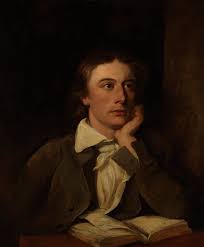Epistle To John Hamilton Reynolds
Dear Reynolds, as last night I lay in bed,
There came before my eyes that wonted thread
Of shapes, and shadows, and remembrances,
That every other minute vex and please:
Things all disjointed come from north and south,--
Two witch's eyes above a cherub's mouth,
Voltaire with casque and shield and habergeon,
And Alexander with his nightcap on;
Old Socrates a-tying his cravat,
And Hazlitt playing with Miss Edgeworth's cat;
And Junius Brutus, pretty well so-so,
Making the best of's way towards Soho.
Few are there who escape these visitings--
Perhaps one or two whose lives have patent wings,
And through whose curtains peeps no hellish nose,
No wild-boar tushes, and no mermaid's toes;
But flowers bursting out with lusty pride,
And young AEolian harps personified;
Some Titian colours touch'd into real life,--
The sacrifice goes on; the pontiff knife
Gleams in the sun, the milk-white heifer lows,
The pipes go shrilly, the libation flows:
A white sail shows above the green-head cliff,
Moves round the point, and throws her anchor stiff;
The mariners join hymn with those on land.
You know the Enchanted Castle -- it doth stand
Upon a rock on the border of a lake,
Nested in trees, which all do seem to shake
From some old magic like Urganda's sword.
O Phoebus! that I had thy sacred word
To show this Castle in fair dreaming wise
Unto my friend, while sick and ill he lies!
You know it well enough, where it doth seem
A mossy place, a Merlin's Hall, a dream;
You know the clear lake, and the little isles,
The mountains blue, and cold near neighbour rills--
All which elsewhere are but half animate,
Here do they look alive to love and hate,
To smiles and frowns; they seem a lifted mound
Above some giant, pulsing underground.
Part of the building was a chosen See
Built by a banish'd Santon of Chaldee;
The other part, two thousand years from him,
Was built by Cuthbert de Saint Aldebrim;
Then there's a little wing, far from the sun,
Built by a Lapland witch turn'd maudlin nun;
And many other juts of aged stone
Founded with many a mason-devil's groan.
The doors all look as if they op'd themselves,
The windows as if latch'd by fays and elves,
And from them comes a silver flash of light
As from the westward of a summer's night;
Or like a beauteous woman's large blue eyes
Gone mad through olden songs and poesies.
See what is coming from the distance dim!
A golden galley all in silken trim!
Three rows of oars are lightening, moment whiles,
Into the verdurous bosoms of those isles;
Towards the shade under the Castle wall
It comes in silence -- now 'tis hidden all.
The clarion sounds, and from a postern-gate
An echo of sweet music doth create
A fear in the poor herdsman who doth bring
His beasts to trouble the enchanted spring,--
He tells of the sweet music and the spot
To all his friends, and they believe him not.
O that our dreamings all, of sleep or wake,
Would all their colours from the sunset take:
From something of material sublime,
Rather than shadow our own soul's day-time
In the dark void of night. For in the world
We jostle- but my flag is not unfurl'd
On the Admiral-staff -- and to philosophize
I dare not yet! Oh, never will the prize,
High reason, and the lore of good and ill,
Be my award! Things cannot to the will
Be settled, but they tease us out of thought;
Or is it that Imagination brought
Beyond its proper bound, yet still confin'd,
Lost in a sort of Purgatory blind,
Cannot refer to any standard law
Of either earth or heaven? It is a flaw
In happiness to see beyond our bourn,--
It forces us in summer skies to mourn,
It spoils the singing of the Nightingale.
Dear Reynolds! I have a mysterious tale
And cannot speak it. The first page I read
Upon a lampit rock of green sea-weed
Among the breakers; 'twas a quiet eve,
The rocks were silent, the wide sea did weave
An untumultuous fringe of silver foam
Along the flat brown sand; I was at home
And should have been most happy,-- but I saw
Too far into the sea, where every maw
The greater on the less feeds evermore.--
But I saw too distinct into the core
Of an eternal fierce destruction,
And so from happiness I far was gone.
Still am I sick of it, and though to-day
I've gather'd young spring-leaves, and flowers gay
Of periwinkle and wild strawberry,
Still do I that most fierce destruction see,--
The Shark at savage prey, the Hawk at pounce,--
The gentle Robin, like a Pard or Ounce,
Ravening a worm -- Away, ye horrid moods!
Moods of one's mind! You know I hate them well.
You know I'd sooner be a clapping Bell
To some Kamschatcan Missionary Church,
Than with these horrid moods be left i' the lurch.
Do you get health -- and Tom the same -- I'll dance,
And from detested moods in new Romance
Take refuge. Of bad lines a Centaine dose
Is sure enough -- and so "here follows prose."
